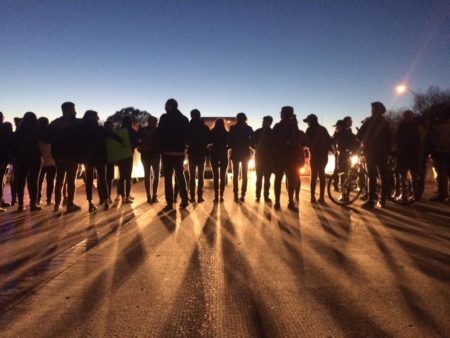I moved to Iowa City in 2007, and I got involved in Iowa City activist communities almost right away. That means I’ve had almost 15 years to see the good and the bad. I also find myself much closer to 40 years old than to 30. It’s left me in a position where I want to reflect on some of those experiences.
I wrote some time ago about Iowa City politics. And even there, I made a few remarks on local non-electoral activism. But I’d like to revisit that and say more.
I won’t review everything, and I’m not going to dig too deeply into details. At least not in this post. And I want to focus more on general lessons than on specific orgs. In short, I’m going to look at the big picture. What works well and what doesn’t? What strengths and weaknesses stand out in Iowa City activist communities?
The Good
When I think about the good and the bad of Iowa City activism, I think about the same things. Lots of new people constantly move to Iowa City. They bring new ideas and new energy. I was one of those people back in 2007. We have a relatively young and enthusiastic population.
All that gives Iowa City activism a certain vitality. It allows us to avoid some of the problems associated with entrenched activists and activist groups. When you load up an activist scene with people and groups that have all been around for 20, 30, even 40 years, you have to wade through all sorts of entrenched power structures, rivalries, and so on. You also might struggle to find new ways of thinking about problems.
Not so much in Iowa City! Many of our activist groups are no more than a few years old. Many people who lead those groups weren’t even a part of Iowa City’s activist scene yet as recently as 2017, 2018, and so on.
All this makes Iowa City unusually friendly and approachable for someone looking to start a new group or join a group where they can get involved quickly. Way more so than any other place I’ve lived.
The Bad
But it’s not always so great to have an activist scene where almost everyone is new! And where everyone moved to Iowa City in the last 5 years. Sometimes the trade-off (vitality for inexperience) isn’t worth it.
For one, Iowa City has far too many activist groups. Often several groups work on the same topic, and sometimes they don’t know the others exist. In recent years, we even find the ultimate irony: umbrella groups that exist in order to coordinate the dozens of groups out there!
While I applaud the effort of the people who organize such groups, the better solution would simply be for some activist groups to fold into other ones and combine their work into one org. The Iowa City DSA, for example, would make a natural home for most groups working on climate change, opposition to police, and so on.
Second, many Iowa City activist groups depend far too much on their founders or core members (often the same person(s)). When the founder leaves, the group falls apart. Or, perhaps even worse, it sticks around as a Zombie Group that exists only on social media. We don’t really need that.
Finally, the biggest, core problem is that many groups don’t sustain themselves. They don’t organize, build a base, and set our strategic goals. Instead, they flit from short-term project to short-term project. They allow Pied Pipers to constantly redirect them. Rather than working on an organized campaign, they react to the latest events of the day. Often by putting together a demonstration (often mislabeled as a ‘protest’ or ‘strike’) and then not really following up on it.
The Kids These Days…
I probably could’ve written all that in 2007. The good and the bad of Iowa City activism remain about the same over time. The ‘kids these days’ aren’t much different from the ‘kids’ in 2007, i.e., when I was one of them. What I call short-term work without a deeper plan, they call having a ‘collab.’ What I call reacting to current events rather than working on a deeper vision, they call being responsive to the community.
To get around the problems, groups should build members, get their members actively involved, and stick to their projects rather than repeatedly dropping everything for shiny new ideas.
Most groups don’t do these things. They fail to build and engage their members. They hold disorganized, open-ended meetings with no agenda where anyone with a shiny new idea can push the group toward another dead-end ‘collab’ or short-term project. And then, when the group fails to sustain itself and folds, the cycle starts anew.
The Good (Again)
The bad isn’t all bad. Sometimes groups should work on short-term projects. And some groups do so very well. I’ve been a part of Iowa City groups that did things like: challenge harassment culture in bars, push for sexual assault prevention training, campaign our local food co-op to stop selling the products of a company opposed to reproductive health care, help tenants fight their landlords, push local companies to pay higher wages, and so on.
We do a great job in Iowa City of repopulating and bringing new energy. That’s one key reason why Iowa City is the best place in Iowa to live. It’s one reason why we have the best local government in the state.
But it’s also one reason why we don’t have a sustained, powerful left-wing movement.
